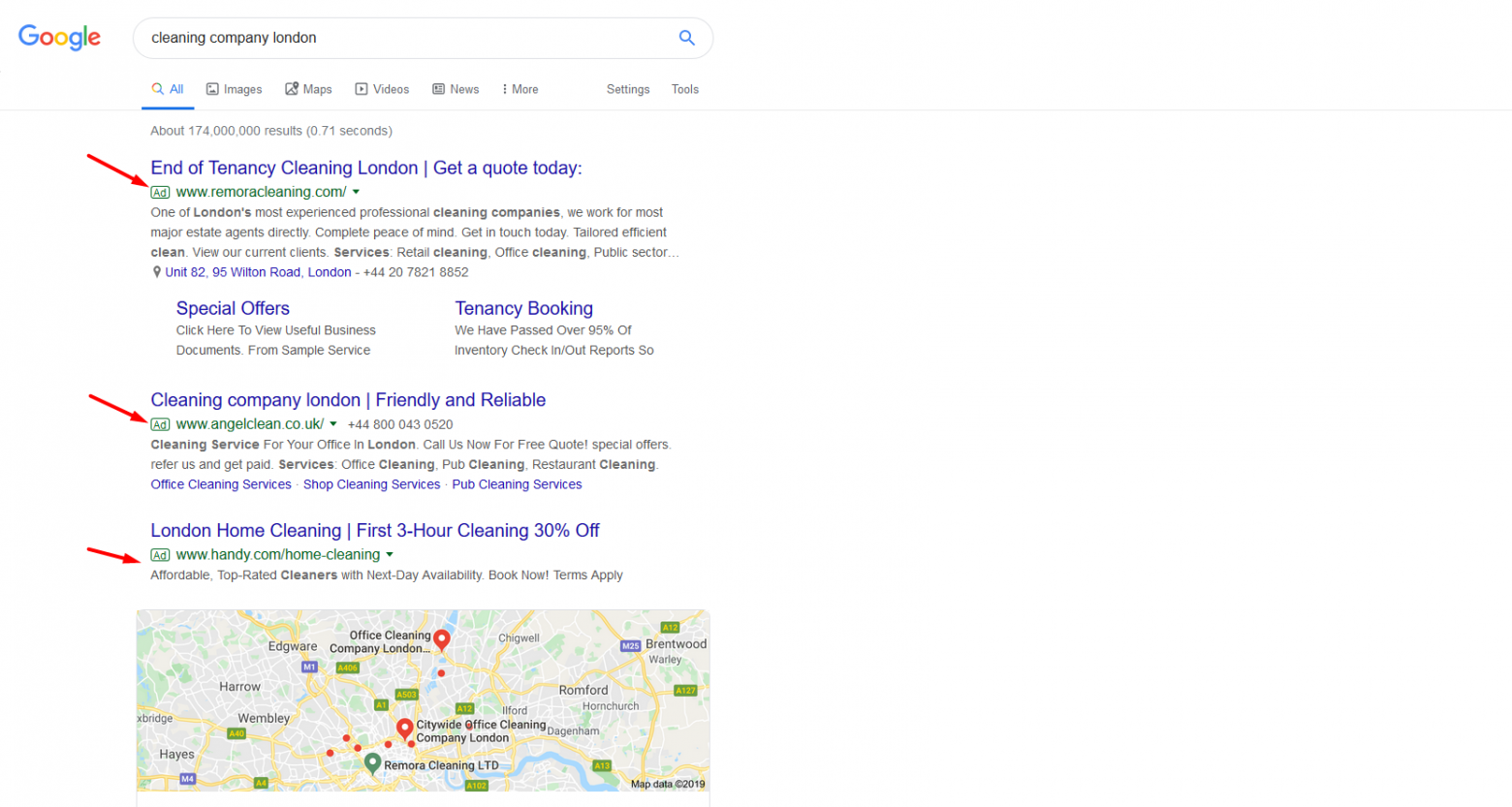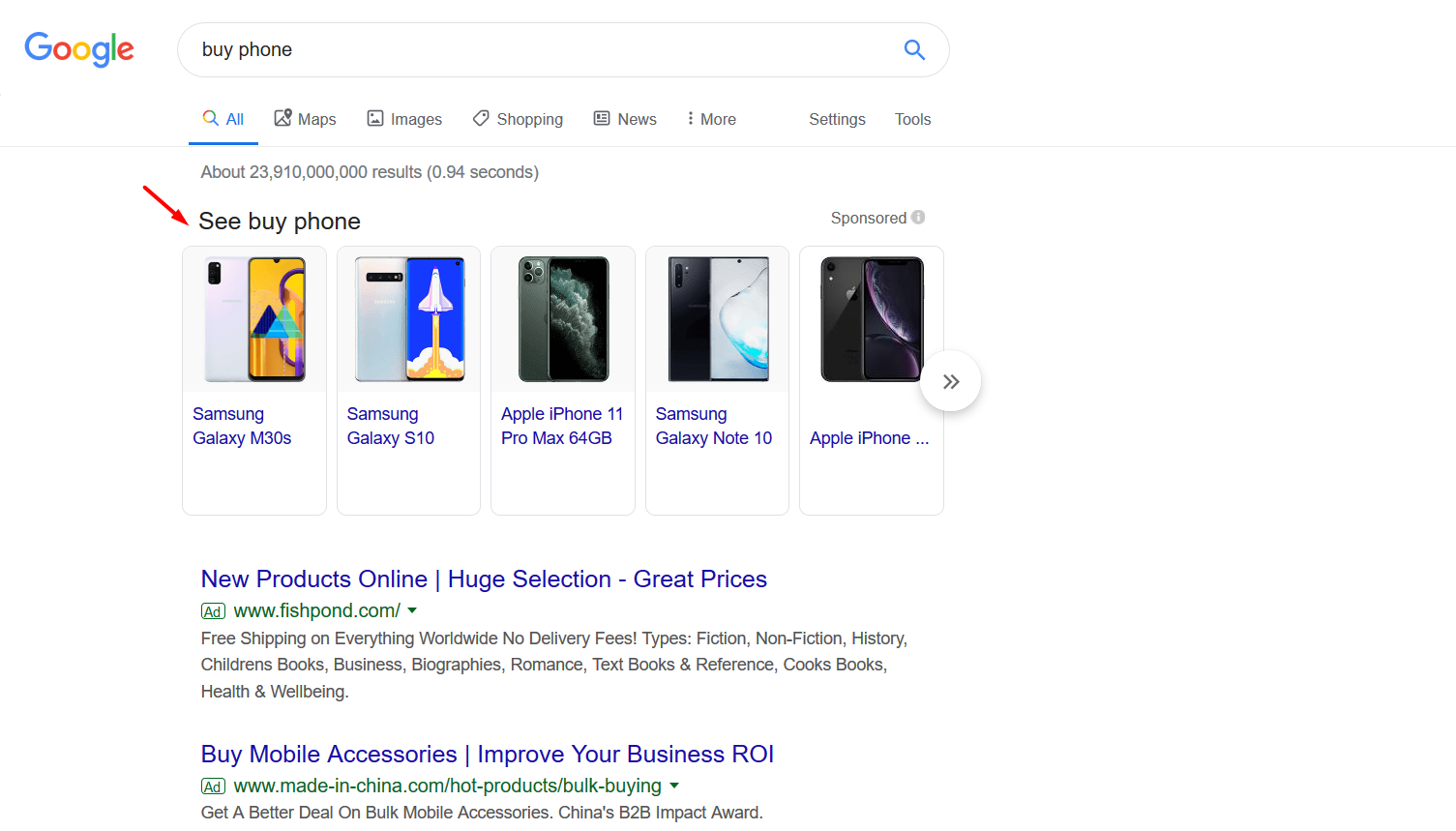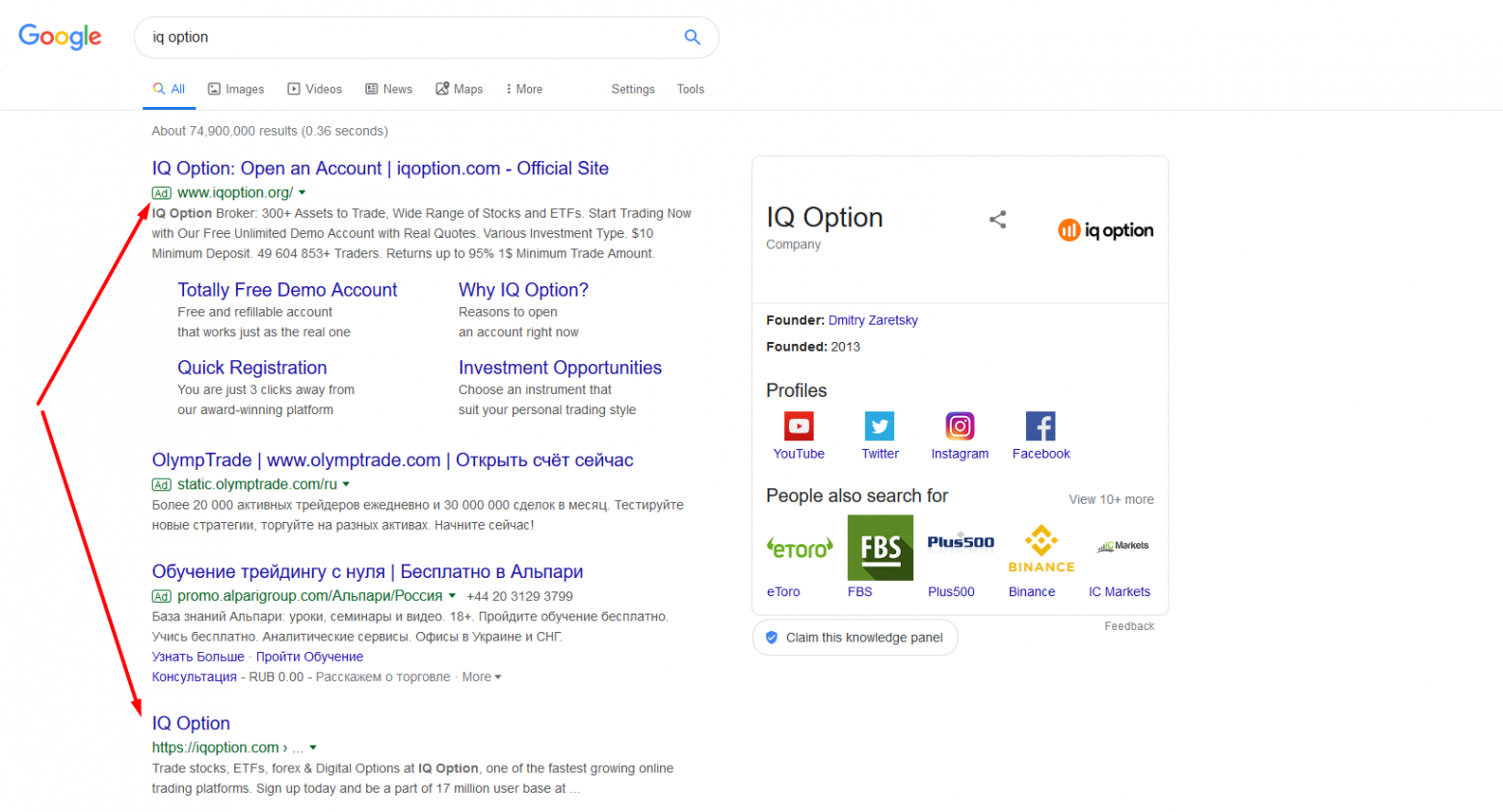What's better for your business?
At a certain point, any website owner wonders what's better: SEO or PPC? Which promotion strategy will be the most rational to use in this particular situation? Or maybe it's best to combine both?
Before you decide between SEO and PPC, you need to consider the differences between them…

PPC (also called pay-per-click advertising, contextual advertising, or contextual targeting) means that your ads appear in the search results and on other partner websites. Those ads are usually displayed above and below the organic results and in the body of a web page of a partner site. Advertisement is displayed according to user's interests and requests.
SEO (search engine optimization) is a gradual improvement of website's structure and content according to the requirements (e.g., Google's Webmaster Guidelines) that makes search engines recognize your site as being more relevant to the users' queries.
PPC, Pay-Per-Click, or Contextual Targeting. PPC is usually used when you need fast results in attracting clients.

The main goal, in this case, is to get fast sales or test out a business model.
The number of paid ads in search engine results has been growing continuously, proving that this method of promotion is popular and effective.
As of now, this way of digital marketing channel users becomes increasingly popular, and the main reason for this is a fast achievement of the desired results. With everything set up correctly, you may feel the first results from your campaign in the first 24 hours or less – which is very tempting for business owners and marketers.
The main thing here is to fine-tune the PPC campaign and work out relevant keywords that will bring you users that are already interested in your product or service. For those who do not have sufficient promotion experience, and decided to set up a campaign on their own, PPC activities can turn out to be much more expensive.
PPC is perfect for seasonal projects, or when you need to promote your brand quickly. Studies show that contextual advertising can increase brand awareness by 80%, so even giants like Facebook and Amazon continue to use it.
Don't forget that PPC isn't just used for search engines. The largest social networks and portals are steadily expanding the set of marketing tools, and ignoring this opportunity clearly won't be reasonable.
Thus, PPC is developing steadily. As a result, new opportunities appear:
Remarketing aims to ensure that a user performs subsequent action. For example, a user visits your online store, selects a computer mouse, and, when it comes to payment, suddenly closes the tab. And thanks to remarketing, he or she will see the advertisement for your store on other websites from Google or other advertising networks. This calls for the action you need — complete the purchase.

Google Shopping and other price comparison platforms are also an excellent tool for promoting online stores. Besides, optimizing your store for those services in a conventional way is impossible, so buying an advertisement is the only option.

The effectiveness of banner advertising (on the Display Network) is directly influenced by how much it matches the topic of the website and the quality of advertising visuals.
For better results, setting up contextual advertising should be handed over to professionals — yes, you will have to pay for it, but this will be times less than if you decided to go the trial and error route and choose between SEO and PPC yourself.
PPC is a perfect tool for testing the demand for your product in new niches, and here its advantage over SEO is undeniable. You don't have to wait for months to get tangible results, and they will be obvious within a week.
PPC effectiveness becomes apparent in situations like when you need to quickly determine the effect of a design change or other large-scale updates. If you have little organic traffic, you risk wasting many months on it. And PPC allows you to find out which option improves conversion in just a few days.
Finally, PPC will help you reach your target audience no matter which gadgets they use. This is especially important now when the number of users of mobile devices is growing year to year, and in some regions, a smartphone is the only way to access the internet.
Let's start with the financial part. As long as there is money in your Google AdWords account, you get traffic, but as soon as it runs out, the traffic disappears. PPC is unlikely to help projects with minimal budgets. Besides, depending on your field, the price per click may vary.
If in the Russian-speaking segment of the Internet, the price per click can still be called affordable, then in the US it is very high, even more so in highly competitive niches. According to statistics, the cost per click for insurance-related queries in the United States can reach more than $50. So, for a moderate budget that you're not planning to increase in the near future when choosing between SEO and PPC, it'll be rational to select the first option.
The level of conversion directly depends on the level of competition, the quality of your product or service, as well as professionalism of an advertising agency. There are cases when inexperienced users, believing they can deal with PPC on their own, lost thousands of dollars without ever reaching the sales.
Therefore, if you have your own product that you would like to promote online, but have no experience of the promotion itself, it is worth hiring a PPC agency. You have to keep in mind that the higher the level of his or her skill, the higher the rate for will be, no matter if it's search engine optimization or PPC.
Choose your keywords, fine-tune your campaign, click the Publish button, and your site will be magically placed above the search results. At the same time, you can choose an incredibly flexible configuration – even indicate the number of the house whose tenants are your potential customers. If you need a similar level of targeting, then PPC is second to none.
The first thing to consider in this context is brand protection. As I've already mentioned, SEO and PPC are simultaneously used even by industry giants, although they rely not on blind luck, but on data from studies in the US, according to which 89% of commercial traffic cannot be obtained by organic optimization.
As you might have guessed, people are more likely to pay attention to ads than to regular search results, and if you supply them with the brand context, they turn into a powerful promotion tool.
Secondly, if the same keywords are used to promote using SEO and PPC, it is highly likely that your site will be presented in search results twice: once as an advertisement, and once in organic results. Why is this useful? There are users who do not hesitate to click on ads, but there are those who don't trust them and prefer organic results. But when there are links in both areas, you reach the target audience better and get the chance to meet your potential customer.

With a decent budget, you shouldn't choose between SEO and Google Ads. It is much more profitable to use both methods at the same time, as well as apply other options of PPC, like placing ads on social media.
Everyone who wants to create an online business that can withstand competition in the long run, must pay attention to this method of promotion. Even if you have an incredibly large budget, spending it exclusively on PPC will be pure recklessness.
In the long run, getting customers from a free traffic source will save a sufficient amount of marketing budget. Which in turn can be directed to the new channels to gain traffic.
Competitors with a weak SEO strategy will be forced to limit themselves to paid traffic and will not be able to experiment with new marketing techniques.
In most cases, SEO will have a more profound promotional effect compared to PPC. But it manifests after six months on average, sometimes even about a year. Why is it still being used?
Organic traffic will come to your website even after you stop the financial support of this online marketing channel.
The main advantage that most SEO fans highlight is that you don't have to pour large amounts of cash in a short time.
The main advantage that most SEO supporters highlight is the lack of the need to inject large amounts in a short period.
Your task is to have a clear action plan, and each subsequent step can be implemented as you get more funds. That is why in the battle SEO vs. PPC, newcomers often pick the first option.
Moreover, if your site has already reached the top of SERP, it's highly unlikely it leaves it any time soon. Thus, you can lower your SEO budget with minimal loss of search traffic and focus on different types of marketing.
You will see the effect from SEO in at least two to four months, so it's not the best fit for seasonal projects (or the campaign has to start three to four months in advance).
Although many will argue that traffic after search engine optimization is almost free, and the cost of maintaining it is negligible – don't trust them blindly.
Google, like any other search engine, makes money not on organic results but on advertising sales, so there are more and more ads each day. For some queries, to get to the actual results, you need to go past four ads, and not every user has enough patience.
Using questionable SEO methods significantly increases your chances of being banned by Google or losing top positions. Search engine algorithms are continually changing, and not many succeed in holding leading positions for several years.
When Is SEO Better Than PPC?
First results
SEO — Slowly
PPC — Quickly
Cost per click
SEO — Low
PPC — High
The need for professional guidance
SEO — You have to collect a list of keywords, put together a clear promotion strategy so that you can't do without a specialist
PPC — You'll need professional help for fine-tuning your campaign
The need for content
SEO — Creating texts is necessary for successful promotion
PPC — Updating your texts when needed should suffice
Campaign cost
SEO — Comparable with PPC
PPC — Comparable with SEO
Effect duration
SEO — From a few months to a few years
PPC — As long as you buy ads
User trust
SEO — Quite high
PPC — Decent but a bit lower than for organic results
Audience targeting
SEO — Is achieved through optimization for target queries. Worse than with PPC
PPC — A wide selection of options: you can choose a region and even specific building
Audience reach
SEO — Relatively broad, you can get traffic from related requests
PPC — By adjusting the campaign settings, you can narrow down or expand your reach.
It is almost impossible to pick a clear winner in this competition since both SEO and PPC are useful in certain circumstances.
Need instant results? — Set up your ad campaign and start getting conversions in the next 24 hours.
Want long-term development of your project? — The best option would be SEO.
The only thing to remember: without a clear understanding of the market and the main nuances of the settings, it will be more rational to turn to professionals. Otherwise, you risk spending a lot of money, but still not get the desired results.
At a certain point, any website owner wonders what's better: SEO or PPC? Which promotion strategy will be the most rational to use in this particular situation? Or maybe it's best to combine both?
Before you decide between SEO and PPC, you need to consider the differences between them…

PPC (also called pay-per-click advertising, contextual advertising, or contextual targeting) means that your ads appear in the search results and on other partner websites. Those ads are usually displayed above and below the organic results and in the body of a web page of a partner site. Advertisement is displayed according to user's interests and requests.
SEO (search engine optimization) is a gradual improvement of website's structure and content according to the requirements (e.g., Google's Webmaster Guidelines) that makes search engines recognize your site as being more relevant to the users' queries.
Let's compare SEO vs.PPC for your business
PPC, Pay-Per-Click, or Contextual Targeting. PPC is usually used when you need fast results in attracting clients.

The main goal, in this case, is to get fast sales or test out a business model.
The number of paid ads in search engine results has been growing continuously, proving that this method of promotion is popular and effective.
PPC Pros:
- Fast to launch & delivers quick results
- Is a great starting point for better promotion
- Efficient for seasonal projects
- Multiple ad formats (remarketing, Google Shopping, Display Network, etc.)
- Easy (and fast) to test out new products or niches
- Easy to test out the effectiveness of new design and website's changes
- It helps you attract your target audience from all devices.
As of now, this way of digital marketing channel users becomes increasingly popular, and the main reason for this is a fast achievement of the desired results. With everything set up correctly, you may feel the first results from your campaign in the first 24 hours or less – which is very tempting for business owners and marketers.
The main thing here is to fine-tune the PPC campaign and work out relevant keywords that will bring you users that are already interested in your product or service. For those who do not have sufficient promotion experience, and decided to set up a campaign on their own, PPC activities can turn out to be much more expensive.
PPC is perfect for seasonal projects, or when you need to promote your brand quickly. Studies show that contextual advertising can increase brand awareness by 80%, so even giants like Facebook and Amazon continue to use it.
Don't forget that PPC isn't just used for search engines. The largest social networks and portals are steadily expanding the set of marketing tools, and ignoring this opportunity clearly won't be reasonable.
Thus, PPC is developing steadily. As a result, new opportunities appear:
Remarketing aims to ensure that a user performs subsequent action. For example, a user visits your online store, selects a computer mouse, and, when it comes to payment, suddenly closes the tab. And thanks to remarketing, he or she will see the advertisement for your store on other websites from Google or other advertising networks. This calls for the action you need — complete the purchase.

Google Shopping and other price comparison platforms are also an excellent tool for promoting online stores. Besides, optimizing your store for those services in a conventional way is impossible, so buying an advertisement is the only option.

The effectiveness of banner advertising (on the Display Network) is directly influenced by how much it matches the topic of the website and the quality of advertising visuals.
For better results, setting up contextual advertising should be handed over to professionals — yes, you will have to pay for it, but this will be times less than if you decided to go the trial and error route and choose between SEO and PPC yourself.
PPC is a perfect tool for testing the demand for your product in new niches, and here its advantage over SEO is undeniable. You don't have to wait for months to get tangible results, and they will be obvious within a week.
PPC effectiveness becomes apparent in situations like when you need to quickly determine the effect of a design change or other large-scale updates. If you have little organic traffic, you risk wasting many months on it. And PPC allows you to find out which option improves conversion in just a few days.
Finally, PPC will help you reach your target audience no matter which gadgets they use. This is especially important now when the number of users of mobile devices is growing year to year, and in some regions, a smartphone is the only way to access the internet.
In general, if you are targeting mobile traffic, you can't gain it without PPC. Firstly, when the search results are displayed, the user will see ads right on top. Secondly, if three out of four PC users do not reach the second page of the search results, then fans of smartphones, as a rule, rarely go below the third position of the first page. This is the area where you can really feel the differences between SEO and PPC.— says Mike Torpen, CMO at Kubas Labs.
PPC Cons:
- Works only as long as you have the money to spend. No money – no advertising
- Quality hugely depends on the marketer's experience and analytics. You can just blow your budget and not get any profit if you hire a wrong person
Finances
Let's start with the financial part. As long as there is money in your Google AdWords account, you get traffic, but as soon as it runs out, the traffic disappears. PPC is unlikely to help projects with minimal budgets. Besides, depending on your field, the price per click may vary.
If in the Russian-speaking segment of the Internet, the price per click can still be called affordable, then in the US it is very high, even more so in highly competitive niches. According to statistics, the cost per click for insurance-related queries in the United States can reach more than $50. So, for a moderate budget that you're not planning to increase in the near future when choosing between SEO and PPC, it'll be rational to select the first option.
Conversion
The level of conversion directly depends on the level of competition, the quality of your product or service, as well as professionalism of an advertising agency. There are cases when inexperienced users, believing they can deal with PPC on their own, lost thousands of dollars without ever reaching the sales.
Therefore, if you have your own product that you would like to promote online, but have no experience of the promotion itself, it is worth hiring a PPC agency. You have to keep in mind that the higher the level of his or her skill, the higher the rate for will be, no matter if it's search engine optimization or PPC.
When Is Contextual Advertising Better than SEO?
- When you need immediate results
- When you need predictable sales
- When you need a highly specific target audience
Choose your keywords, fine-tune your campaign, click the Publish button, and your site will be magically placed above the search results. At the same time, you can choose an incredibly flexible configuration – even indicate the number of the house whose tenants are your potential customers. If you need a similar level of targeting, then PPC is second to none.
How Does PPC Help SEO?
The first thing to consider in this context is brand protection. As I've already mentioned, SEO and PPC are simultaneously used even by industry giants, although they rely not on blind luck, but on data from studies in the US, according to which 89% of commercial traffic cannot be obtained by organic optimization.
As you might have guessed, people are more likely to pay attention to ads than to regular search results, and if you supply them with the brand context, they turn into a powerful promotion tool.
Secondly, if the same keywords are used to promote using SEO and PPC, it is highly likely that your site will be presented in search results twice: once as an advertisement, and once in organic results. Why is this useful? There are users who do not hesitate to click on ads, but there are those who don't trust them and prefer organic results. But when there are links in both areas, you reach the target audience better and get the chance to meet your potential customer.

With a decent budget, you shouldn't choose between SEO and Google Ads. It is much more profitable to use both methods at the same time, as well as apply other options of PPC, like placing ads on social media.
SEO
Everyone who wants to create an online business that can withstand competition in the long run, must pay attention to this method of promotion. Even if you have an incredibly large budget, spending it exclusively on PPC will be pure recklessness.
In the long run, getting customers from a free traffic source will save a sufficient amount of marketing budget. Which in turn can be directed to the new channels to gain traffic.
Competitors with a weak SEO strategy will be forced to limit themselves to paid traffic and will not be able to experiment with new marketing techniques.
SEO Pros
In most cases, SEO will have a more profound promotional effect compared to PPC. But it manifests after six months on average, sometimes even about a year. Why is it still being used?
Organic traffic will come to your website even after you stop the financial support of this online marketing channel.
The main advantage that most SEO fans highlight is that you don't have to pour large amounts of cash in a short time.
The main advantage that most SEO supporters highlight is the lack of the need to inject large amounts in a short period.
Your task is to have a clear action plan, and each subsequent step can be implemented as you get more funds. That is why in the battle SEO vs. PPC, newcomers often pick the first option.
Moreover, if your site has already reached the top of SERP, it's highly unlikely it leaves it any time soon. Thus, you can lower your SEO budget with minimal loss of search traffic and focus on different types of marketing.
SEO Cons
You will see the effect from SEO in at least two to four months, so it's not the best fit for seasonal projects (or the campaign has to start three to four months in advance).
Although many will argue that traffic after search engine optimization is almost free, and the cost of maintaining it is negligible – don't trust them blindly.
Google, like any other search engine, makes money not on organic results but on advertising sales, so there are more and more ads each day. For some queries, to get to the actual results, you need to go past four ads, and not every user has enough patience.
Using questionable SEO methods significantly increases your chances of being banned by Google or losing top positions. Search engine algorithms are continually changing, and not many succeed in holding leading positions for several years.
When Is SEO Better Than PPC?
- When your goal is to significantly reduce the cost of attracting new customers in the long run
- When your budget is limited, and there is no need for instant results
- When you are interested in ROI growth, even after the advertising campaign
PPC Vs. SEO: What's the Difference?
First results
SEO — Slowly
PPC — Quickly
Cost per click
SEO — Low
PPC — High
The need for professional guidance
SEO — You have to collect a list of keywords, put together a clear promotion strategy so that you can't do without a specialist
PPC — You'll need professional help for fine-tuning your campaign
The need for content
SEO — Creating texts is necessary for successful promotion
PPC — Updating your texts when needed should suffice
Campaign cost
SEO — Comparable with PPC
PPC — Comparable with SEO
Effect duration
SEO — From a few months to a few years
PPC — As long as you buy ads
User trust
SEO — Quite high
PPC — Decent but a bit lower than for organic results
Audience targeting
SEO — Is achieved through optimization for target queries. Worse than with PPC
PPC — A wide selection of options: you can choose a region and even specific building
Audience reach
SEO — Relatively broad, you can get traffic from related requests
PPC — By adjusting the campaign settings, you can narrow down or expand your reach.
Summary
It is almost impossible to pick a clear winner in this competition since both SEO and PPC are useful in certain circumstances.
Need instant results? — Set up your ad campaign and start getting conversions in the next 24 hours.
Want long-term development of your project? — The best option would be SEO.
The only thing to remember: without a clear understanding of the market and the main nuances of the settings, it will be more rational to turn to professionals. Otherwise, you risk spending a lot of money, but still not get the desired results.